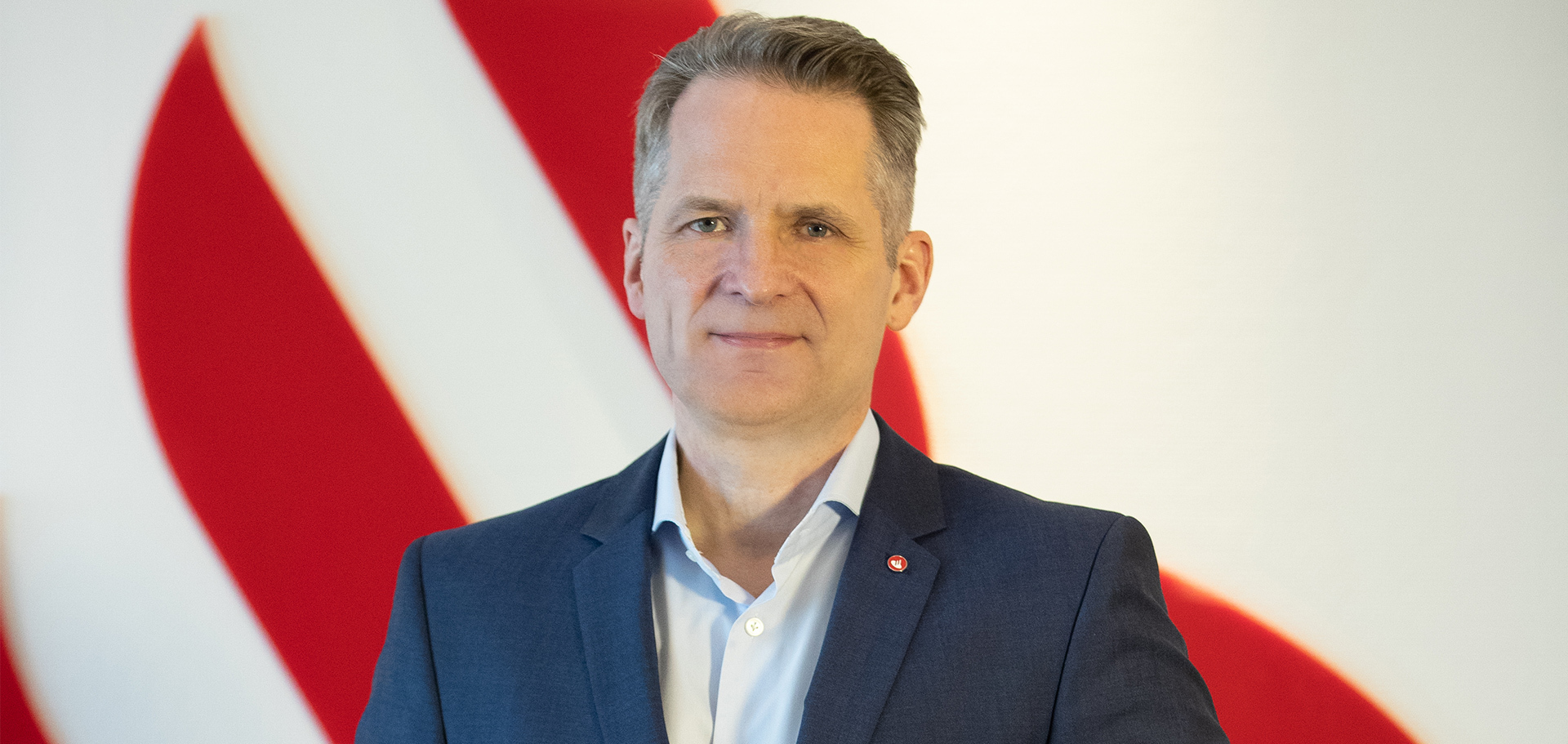
Interview with Michał Gajewski, CEO of Santander Bank Polska
- GRI:
-
Statement on sustainable development strategy2-22Statement on sustainable development strategy

2021 was another year marked by the pandemic. What solutions were put in place, what were the priorities to ensure that that the bank meets its business objectives and grows?
The past year was another challenging period, yet we ended it with solid financial performance. Once again, we proved that we are able to operate effectively in rapidly changing conditions and that we are a reliable, stable and responsible partner for our customers, stakeholders and the Polish economy.
Our priority remains to take action to minimise our environmental impact. In 2021, the Santander Group announced its Net Zero strategy, which aims to achieve climate neutrality by 2050. Despite many other ongoing challenges, delivering our banking strategy based on ESG indicators remains a key focus.
What measures has Santander Bank Polska taken to support customers and respond to their changing needs?
In retail banking, we focused on improving the customer experience and expanding, digitalising and simplifying our services. We have strived to increase the digital activity of our customers. At the end of last year, more than 3 million of them were managing their finances remotely. This makes banking even more accessible to all customer groups. In the spirit of care for the environment, we also launched a payment card made of biodegradable plastic. More than 40% of the cards issued by us last year were already made of it.
In the SME segment, we maintained our first position in terms of the value of working capital loans sold to one-person businesses throughout 2021 and access to financing is the key determinant of their growth prospects. To support our customers in difficult times, we offered the possibility of filing applications and settlements of financial assistance in our systems. More than 7,200 companies benefited from the PFR’s Financial Shield 2.0 aid scheme.
On the other hand, in our cooperation with large companies and corporations, we focused last year on solutions that support the green transformation, and this was also possible thanks to new digital tools such as iBiznes24 e-banking or the GTS (One Trade Portal) platform.
What has been the bank’s biggest HR management challenge in the past year?
The source of Santander Bank Polska’s human and intellectual capital is its employees. The bank provides them with opportunities to improve their competences and systematically motivates them to knowledge sharing and self-education. The bank’s organisational culture has been built on values and ethical standards that build trust and lasting loyalty among employees. Of course, the pandemic period necessitated a complete change in the work model and the use of flexible methods of performing job duties. Another important aspect was to support employees in terms of psychological comfort and ensuring a work-life balance. 2021 was for us, as for many other companies, the time of implementing flexible and hybrid work models, adapted to the needs of both our employees and our customers. We want this new model to be comfortable for our employees and help them to develop and achieve fulfilment, while invariably ensuring that our clients receive the highest level of service.
Thinking back over the past year, what would you consider to be Santander Bank Polska’s greatest achievement in terms of the organisation’s contribution to sustainable development, and what do you think could have been done better? Where does the bank see itself failing in this regard?
The key challenges within our Responsible Banking agenda, both in the past year and in the coming years, are those arising from the implementation of the European Green Deal. The European Commission’s initiative to achieve climate neutrality in Europe by 2050 means that we have to develop new products, offer customer education, introduce changes in ESG risk management (including climate risk) , but also withstand regulatory pressure. The coming decades will certainly see an increase in the importance of sustainable finance issues, which will be felt across the entire EU financial sector.
At Santander Bank Polska, we are prepared to actively support our customers in the changes that must take place over the next two decades. Particularly in Poland, where until last year around 70% of energy came from coal. The process of transforming our energy industry will require a lot of effort on the part of companies, but also knowledge and agility on the part of financing institutions. Our experience in promoting and launching new products and our expertise in this area will be an important value in the future. Therefore, one of the most important challenges for Santander Bank Polska in the coming years will be the issue of the green agenda – particularly in terms of products and climate risk management. We feel that, despite the numerous initiatives and actions we have taken, the transformation process in Poland is not progressing as quickly as it should – so we hope that in the coming years we will be able to help accelerate the necessary changes. In our bank, we have made significant progress in the area of corporate banking, but we believe that we can do even more in the retail area by offering a wider range of ESG-related solutions. Both the pandemic and the war in Ukraine have made it more difficult for many of our customers to meet pro-environmental targets. However, in the long term, it is the speed and effectiveness of the changes aimed at combating climate change that will have the strongest impact on the future for all of us.
Why can Santander Bank Polska be considered a leader in the Polish market of financial institutions when it comes to sustainable finance?
Our activities in this field are very broad. For many instruments and transactions we were pioneers in the Polish market. In 2021, supporting our clients in their green transformation, we completed transactions in the area of renewable energy worth PLN 503.7 million, green construction worth PLN 495 million, mobility projects worth PLN 360 million, and in the agro sector amounting to over PLN 350 million. We issued the first sustainable debt securities with a nominal value of PLN 750 million. The funds raised from the issue will be used to finance or refinance Eligible Green Assets or Eligible Social Assets.
We also participated in the issuance of green bonds for clients in the property development and engineering sectors. In cooperation with Banco Santander, we obtained for a client financing linked to the fulfilment of socio-environmental criteria.
We are also actively working with local authorities, offering new financing solutions for energy transition and zero-emission public transport. Together with Bank Gospodarstwa Krajowego, we financed the purchase of electric buses for Poznań, which enabled us to contribute to improving air quality in the city. In the coming years, we will consistently implement the ESG strategy. We are aware that our commitment to green financing and transformation of the economy is both an economic necessity and an expression of responsibility for future generations.
What macroeconomic, social and political trends do you notice affecting Santander Bank Polska’s strategy to contribute to sustainable development?
In 2021, the economy rebounded dynamically thanks to the easing of pandemic restrictions, the progressive vaccination against COVID-19 and the global economic recovery. All major components of GDP – consumption, investment and foreign exchange – grew rapidly. Imports increased much faster than exports and the 2020 domestic foreign trade surplus turned into a deficit. At the same time, some sectors continued to face disruption in global supply chains. However, we entered 2022 with rising inflation and a cycle of interest rate hikes that could slow economic growth. The factor that has changed everything is the war in Ukraine and all its consequences, e.g. for the food market, energy resources or further disruption of production and supply of certain commodities. The COVID-19 pandemic has not slowed down the European Union’s green agenda or our efforts in this area. It seems that the war in Ukraine, through the abandonment of Russian raw material supplies, will accelerate the green revolution – mainly in energy. This means that the entire financial sector needs to be even more supportive of domestic energy companies, but also of many industries that have hitherto been dependent on raw materials from the East.
What are Santander Bank Polska’s main challenges and objectives related to sustainable development for the next year, and what are the bank’s plans for the next 3-5 years?
As of 2022, we are implementing the Group’s Sustainable Finance Classification System (SFCS), which, based on the Taxonomy, defines the technical criteria that green project financing, both general -purpose and specific – must meet. In 2021, we also reported compliance with the European Taxonomy and assessed how much of our portfolio qualifies as contributing to climate change mitigation and adaptation. As a milestone, we announced our Net Zero strategy, which aims to achieve climate neutrality by 2050. In order to implement it, Santander Bank Polska will, from 2030, stop financing energy companies that generate more than 10% of their revenue from thermal coal production. By then, we will also completely reduce our historical exposure to thermal coal producers. In the following years, further decarbonisation targets will be set for the other sectors – oil and gas, transport and metals. Over the next five years, Santander Bank Polska also intends to revise its product strategy so that it can offer products that reduce or eliminate carbon emissions to customers in each business area. For the next few years, the Santander Group has set itself climate targets in which Group companies from all countries of the world are involved. Among these, there is a goal to raise and make available EUR 120 billion of green financing by 2025, by which time 100% of the energy used by us will come from renewable sources. The longer-term goal is the aforementioned carbon neutrality, and the active support of customers – not only with financing, but also with advice and expertise. Of all the challenges that lie ahead, those related to climate change will most strongly determine the success of future business projects, as well as the well-being of all of us.